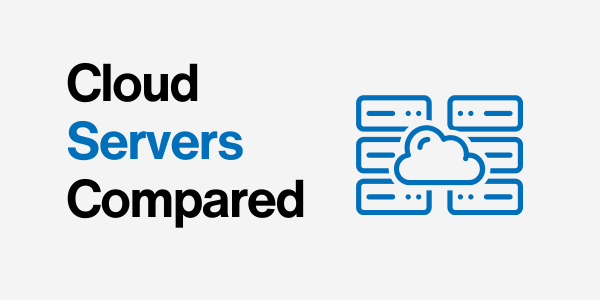In today's digital landscape, harnessing the power of the cloud is essential for businesses seeking to thrive and innovate. Whether you're launching a website, running a mission-critical application, or scaling your online presence, choosing the right cloud server and hosting provider is paramount. But with so many options available, navigating the complexities of cloud hosting can feel overwhelming. So, let’s explore different providers as well as key factors to consider when selecting the best cloud hosting provider to propel your business forward.
What is cloud hosting?
Cloud hosting is a type of web hosting service that utilizes cloud computing technology to deliver resources like virtual servers, storage, and networking over the internet. Unlike traditional hosting methods that rely on physical servers, cloud hosting operates on a distributed network of virtual servers hosted across multiple data centers. This allows for greater scalability, flexibility, and reliability because resources can be dynamically allocated and adjusted based on demand. Cloud hosting providers typically offer pay-as-you-go pricing models, where users only pay for the resources they consume.
How does cloud hosting work?
Cloud hosting works by leveraging virtualization technology to create virtual instances of servers on a cloud infrastructure. These virtual servers are hosted on a network of physical servers housed in data centers around the world. When a user subscribes to a cloud hosting service, they are allocated a certain amount of resources such as CPU, RAM, and storage, which are provisioned from the underlying pool of physical servers. Users can then deploy their websites, applications, or services on these virtual servers, accessing them remotely over the internet. The distributed nature of cloud hosting ensures high availability and redundancy, as data and applications are replicated across multiple servers and locations. Additionally, cloud hosting platforms often provide management tools and APIs for users to monitor and control their resources effectively.
Top 10 Benefits of Cloud Hosting
1. Scalability
Cloud hosting allows for quick and easy scaling of resources up or down based on demand, enabling businesses to adapt to changing needs efficiently.
2. Flexibility
Users can customize resource allocation to match specific requirements, providing greater flexibility in managing workloads and applications.
3. Reliability
With distributed networks and redundant infrastructure, cloud hosting offers high availability and minimizes the risk of downtime due to hardware failures or maintenance.
4. Affordability
Pay-as-you-go pricing models eliminate the need for upfront hardware investments, making cloud hosting a cost-effective solution for businesses.
5. Security
Cloud hosting providers implement robust security measures, including encryption, firewalls, and regular audits, to protect data and infrastructure from threats.
6. Accessibility
Cloud hosting enables remote access to resources, facilitating collaboration and enhancing productivity for distributed teams.
7. Disaster Recovery
Built-in redundancy and backup capabilities in cloud hosting help businesses recover data and applications quickly in case of a disaster, ensuring business continuity.
8. Performance
Cloud hosting platforms often utilize advanced technologies and infrastructure to deliver high-performance computing and storage solutions, enhancing application performance and user experience.
9. Global Reach
Cloud hosting providers operate data centers in multiple geographic locations, allowing businesses to reach customers and users worldwide with low latency and high reliability.
10. Innovation
Cloud hosting enables businesses to experiment, innovate, and deploy new applications and services rapidly, leveraging the agility and scalability of cloud infrastructure to stay competitive in the market.
How to Choose the Best Public Cloud Server & Hosting Provider
Choosing the best cloud server and hosting provider is crucial for ensuring the success and efficiency of your online ventures. Here are some factors to consider and things to look for when making your decision:
Performance & Reliability
- Look for providers offering a high uptime guarantee (ideally 99.9% or higher) to ensure your website or application is always accessible.
- Check if the provider uses high-quality hardware and infrastructure to deliver optimal performance and reliability.
- Ensure the provider offers fast and reliable network connectivity to deliver content quickly to users worldwide.
Data Storage & Scalability
- Assess the available storage options and ensure they meet your data storage needs.
- Choose a provider that offers scalable resources, allowing you to easily upgrade or downgrade server resources as your business grows or requirements change.
Security
- Ensure the provider employs robust encryption methods to protect your data from unauthorized access.
- Look for providers with built-in firewalls and intrusion detection systems to safeguard against cyber threats.
- Choose a provider that conducts regular security audits and complies with industry standards and regulations.
Pricing Plans
- Look for providers with transparent pricing plans that clearly outline the cost of services and any additional fees.
- Consider providers offering pay-as-you-go pricing models, allowing you to pay only for the resources you use.
Customer Support
- Choose a provider that offers 24/7 customer support via multiple channels to address any issues or concerns promptly.
- Ensure the provider's support team has the technical expertise to assist you with setup, configuration, and troubleshooting.
Compliance & Certifications
- Check if the provider complies with relevant industry regulations and standards to ensure data protection and regulatory compliance.
- Look for providers with certifications that demonstrate their commitment to security, reliability, and quality of service.
Backup & Disaster Recovery
- Assess the provider's backup solutions and ensure they offer automated backups at regular intervals to prevent data loss.
- Choose a provider with robust disaster recovery capabilities to minimize downtime and ensure business continuity in the event of a catastrophe.
By carefully evaluating these factors and considering your specific requirements, you can select the best cloud server and hosting provider that meets your business needs and goals.
The Best Public Cloud Server & Hosting Providers for 2024
Microsoft Azure
Microsoft Azure is a comprehensive cloud computing platform offered by Microsoft, providing a broad range of services for computing, storage, databases, networking, and AI. With seamless integration with Microsoft's products and services, Azure is well-suited for organizations already invested in the Microsoft ecosystem. Its strong support for hybrid cloud deployments, comprehensive compliance and security features, and extensive global presence make it a reliable choice for businesses seeking to migrate and manage their applications and workloads in the cloud.
Pros:
- Seamless integration with Microsoft's products and services.
- Wide range of enterprise-grade services and tools.
- Strong support for hybrid cloud deployments.
- Comprehensive compliance and security features.
Cons:
- Complex pricing model with potential hidden costs.
- Limited availability in certain regions compared to AWS.
- Some services may have a steeper learning curve.
IBM Cloud
IBM Cloud is a cloud computing platform offered by IBM, providing services for computing, storage, databases, AI, and blockchain. With a focus on hybrid and multi-cloud environments, IBM Cloud offers tools and services to help businesses modernize their applications and infrastructure. Leveraging IBM Watson for AI and analytics capabilities, IBM Cloud enables organizations to unlock insights and accelerate innovation. Its extensive compliance and security features along with competitive pricing options make it an attractive choice for businesses looking to transform digitally and drive growth.
Pros:
- Strong focus on hybrid and multi-cloud environments.
- Integration with IBM Watson for AI and analytics capabilities.
- Extensive compliance and security features.
- Competitive pricing with flexible payment options.
Cons:
- Smaller market share compared to major competitors.
- Limited availability in some regions.
- User interface and documentation may not be as user-friendly as other providers.
Amazon Web Services (AWS)
Amazon Web Services (AWS) is a leading cloud platform offering a comprehensive suite of services ranging from computing and storage to databases and networking. With a global infrastructure comprising data centers in multiple regions, AWS ensures high availability and scalability for businesses of all sizes. Its robust security features, extensive compliance certifications, and pay-as-you-go pricing model make it a preferred choice for organizations seeking reliable and cost-effective cloud solutions. From startups to enterprises, AWS provides the tools and infrastructure necessary to innovate, scale, and succeed in today's competitive landscape.
Pros:
- Extensive range of services and features.
- Global infrastructure with data centers in multiple regions.
- Strong security measures and compliance certifications.
- Excellent scalability and flexibility.
Cons:
- Complex pricing structure can be difficult to understand.
- Additional costs for data transfer and certain services.
- Steeper learning curve for beginners.
Google Cloud Platform (GCP)
Google Cloud Platform (GCP) is a cloud computing platform that provides a wide range of services for computing, storage, databases, machine learning, and more. Leveraging Google's expertise in data management and analytics, GCP offers a high-performance infrastructure with global availability and strong integration with Google's ecosystem of tools and services. Its competitive pricing, sustained use discounts, and advanced capabilities in areas like machine learning and data analytics make it an attractive option for businesses looking to modernize their IT infrastructure and drive innovation.
Pros:
- Strong performance and reliability.
- Competitive pricing with sustained use discounts.
- Integration with Google's ecosystem of tools and services.
- Advanced machine learning and analytics capabilities.
Cons:
- Smaller global footprint compared to AWS and Azure.
- Less extensive service offerings in some areas.
- Documentation and support may not be as robust as competitors.
Need help choosing the best cloud server & hosting provider?
Meridian IT is your trusted partner in navigating the complex landscape of cloud servers and hosting solutions. With years of expertise in the industry, we understand the challenges businesses face when selecting the right cloud provider to meet their unique needs.
From assessing your requirements and evaluating different cloud options to implementing and managing your chosen solution, our team of experts is dedicated to delivering personalized recommendations and solutions that align with your business objectives. We'll work closely with you to identify the best cloud server and hosting provider that fits your requirements and budget.
Don't navigate the cloud journey alone. Partner with Meridian IT and unlock the full potential of cloud technology for your business.




